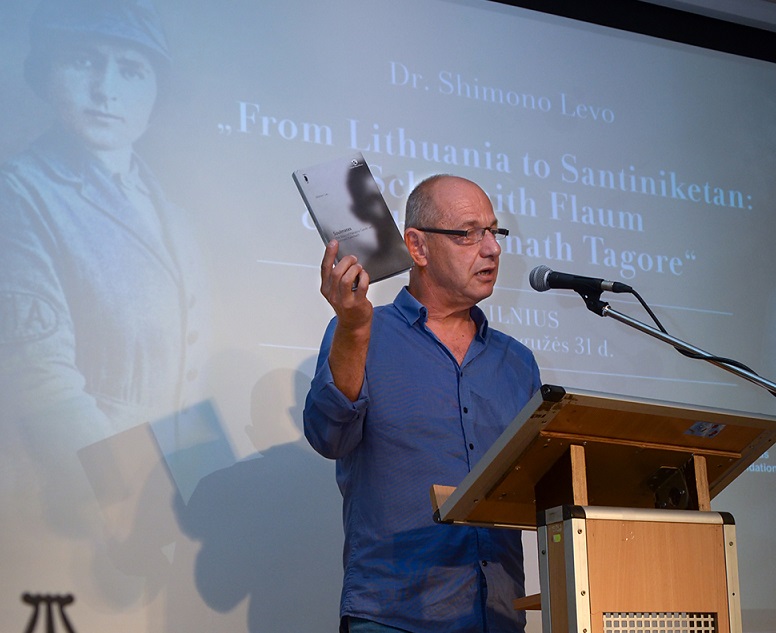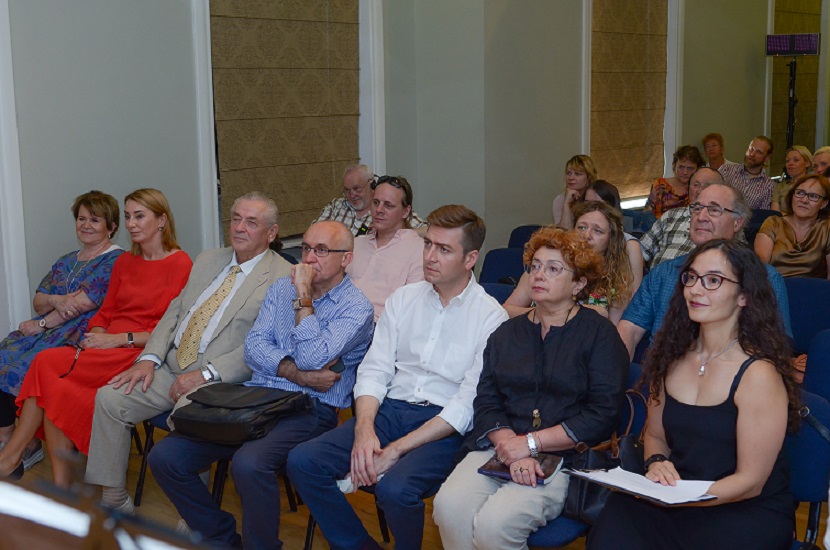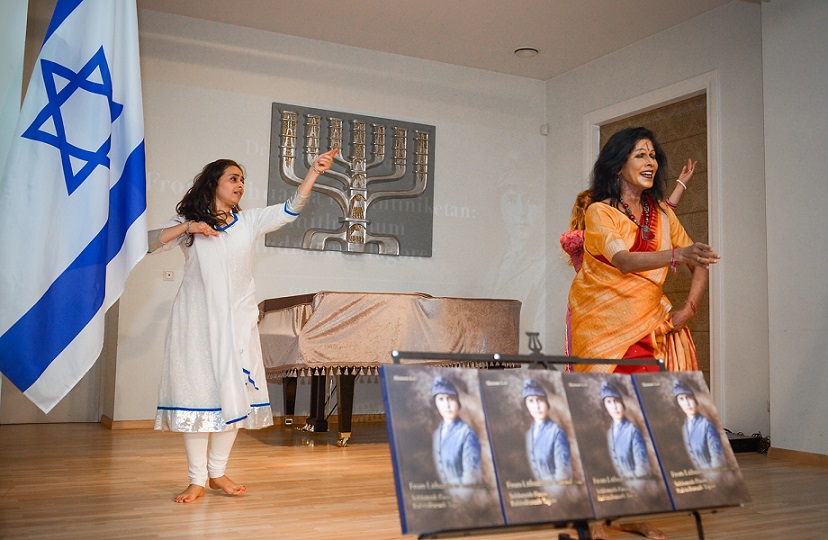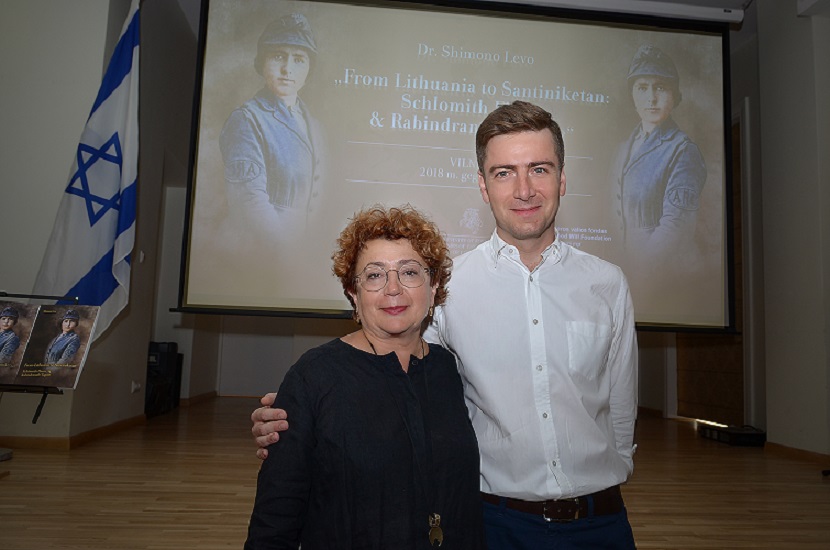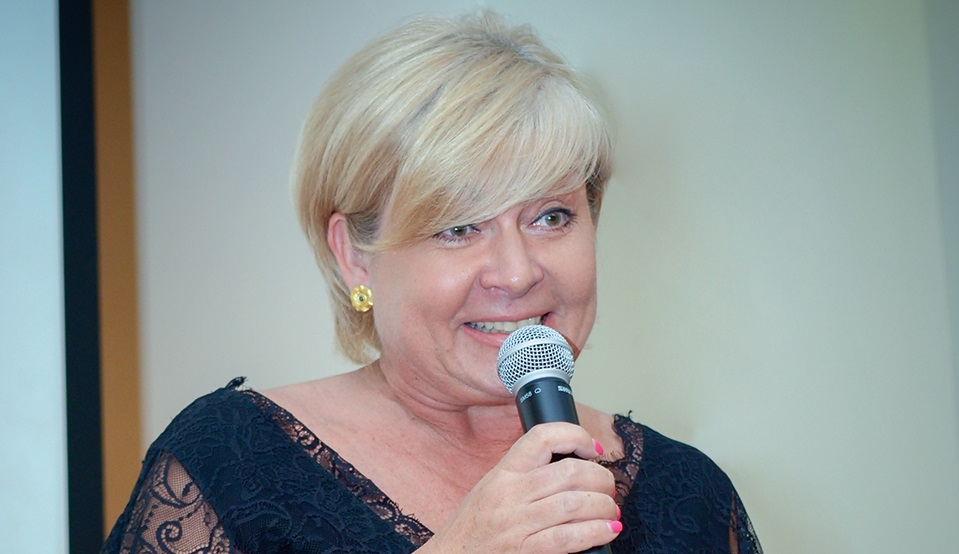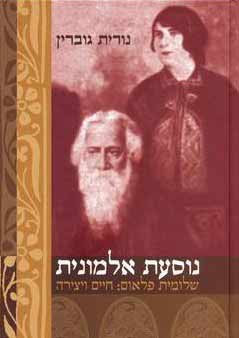
English and Lithuanian editions of Dr. Shimon Lev’s book “From Lithuania to Santiniketan: Schlomith Flaum and Rabindranath Tagore” (originally written in Hebrew) were launched at the Lithuanian Jewish Community on the evening of May 31 with pageantry, live Indian music and dance, readings of selections and speeches by the author, the Lithuanian intelligentsia and members of the diplomatic corps.
Shovana Narayan, recipient of a national award in India and classical Indian dance master, performed several pieces based on Tagore’s poetry with two assistants to kick off the event. Narayan is related to Rabindranath Tagore.
Judita Gliauberzonaitė read selections of Tagore’s poetry in Lithuanian.
Lithuanian Jewish Community chairwoman Faina Kukliansky welcomed the audience and speakers, noting the unique nature of Flaum’s travelogues and testimony, and said it wasn’t very often the LJC hosted such highly cultural and intellectual evenings as this one.
Former Lithuanian ambassador to India Laimonas Talat-Kelpša and his wife, celebrating her birthday, attended and Talat-Kelpša spoke about the remarkable travels Schlomith Flaum undertook in the early 20th century and the connections between Lithuania, India, Israel, and the connections between Zionism, the national movement in India and Lithuanian statehood.
Author and Israeli Litvak Dr. Shimon Lev talked about how Flaum became the earliest source of information about India in nascent Israel, her strength as an early female traveller and travel writer and the magic involved in the process of translation. He also spoke about Vilnius as a center of learning with the Vilna Gaon as the preeminent Jewish scholar in the modern age.
Lithuanian writer Vytautas Toleikis spoke at length on the topic of Litvak culture, praising Flaum as a writer and noting he was getting the impression many important historical leaders had a lesser-known Litvak partner, including Joe Slowo and Nelson Mandela in South Africa, and now Flaum and Rabindranath in India, in addition to Kallenbach and Gandhi.
Retired Indian Air Force wing commander and India’s general consul in Lithuania Rajinder Kumar Chaudhary, VSM, greeted former ambassador Talat-Kelpša and said he hadn’t really retired but was now India’s eternal ambassador to Lithuania, and Lithuania’s to India.
Judita Gliauberzonaitė ended the event with another reading of Tagore’s poetry in Lithuanian.
Journalist and well-known Lithuanian television hostess Edita Mildažytė was the MC for the entire event.
Schlomith Flaum’s name is largely unknown outside a small circle of scholars. The educated Litvak traveller grew up in Lithuania. Her father was Yitzhak Shlomo Flaum, the son of a famous rabbi who lived in Krekenava near Panevėžys. The family had changed their surname from Luria to Flaum for “understandable reasons” as Schlomith herself wrote, so as not to appear “so Jewish.” Schlomith Flaum was born in Kaunas in 1893. Her Zionist father was a successful businessman trading in lumber. She loved and respected her father and wrote about him as her “teacher and mentor.” Her parents invested in her education and she learned languages privately, then entered the Kaunas Gymnasium and continued her education in Frankfurt. She completed training as a kindergarten teacher in 1911 and began to work as such. That same year she travelled to Palestine in fulfillment of her father’s Zionist dream. She travelled much throughout the world. As a teacher she devoted much effort to improving herself in that career and kept up with the latest teaching methods.
She left Palestine for New York in 1921 to visit her brothers and continue her teaching career. She attended a lecture about Tagore at synagogue and was enchanted by the poet’s personality and intellect. Flaum wrote him a letter offering to serve as his German teacher and to help him with her wealth of experience. Thus she went to India and lived there from 1922 to 1924. She called it the happiest time of her life. Curiosity led her to the newly-opened Visva-Bharati college in Santiniketan, a small city in northeast India near Calcutta. During her two years there she met and communicated with the main leaders and supporters of the Indian independence movement, including Sarojini Naidu, Annie Bessant and Mohandas Gandhi.
Despite all the remarkable people she met on her travels, her friendship with the Indian poet Rabindranath Tagore left the most lasting impression. She said he completely changed her life. Many years afterwards she wrote she herself had achieved the state of mind the Hindus call samadhi, a kind of continual ecstasy.
Tagore’s “Gitanjali, or Song Offerings,” which he himself translated to English, received the Nobel Prize in Literature in 1913.
Flaum’s two years spent in Santiniketan made her Tagore’s unofficial ambassador to the world. She wrote various publications on Tagore, Gandhi and India. Her work has been collected in two volumes so far with an additional 20 separate articles.
Schlomith Flauma passed away in Israel in 1963 at the age of 70, alone, in desperate poverty and forgotten. Two books about her by Nurit Goyrin were published in Hebrew by Caramel Publishing with the titles roughly translating as “The Unknown Traveller” and “Schlomith Flaum: Life and Works.”
These two new translations of Shimon Lev’s book by the Lithuanian embassy to India with support from the Goodwill Foundation and others could serve to introduce Schlomith Flaum to the world and to her own native Lithuania.
Photographs by Milda Rūkaitė
